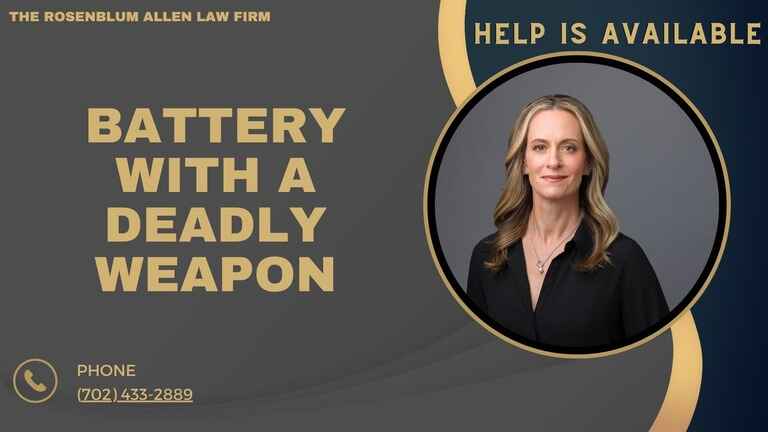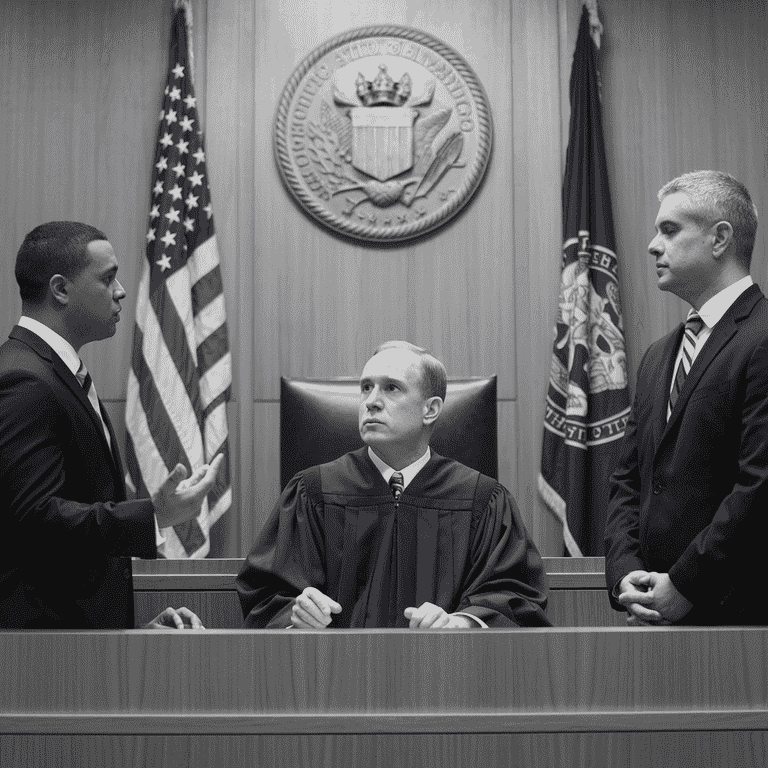Battery with a deadly weapon is a serious charge in criminal law. This type of offense isn’t just about physical harm—it involves using or threatening to use an item capable of causing severe injury or even death. A conviction for this charge can lead to years of prison time, steep fines, and other life-changing consequences. This article explains what battery with a deadly weapon is, the elements needed to prove it, and the possible defenses.
If you’re dealing with this charge, understanding the details can help you make informed choices.

What Is Battery with a Deadly Weapon?
Definition of Battery
Battery, in legal terms, refers to any intentional and unlawful physical contact with another person. To qualify as battery, this contact doesn’t necessarily have to cause serious injury but must be offensive or harmful. Here are some core points:
- Physical contact: Any form of unwanted touch, shove, or hit.
- Intent: The person committing the act must mean to make contact, even if they didn’t intend serious harm.
- Harm level: Battery can range from minor contact to actions causing major injury.
Unlike assault, which can involve threats or attempts to cause harm without actual contact, battery always requires physical contact.
Definition of a Deadly Weapon
A deadly weapon is any item that can cause severe bodily harm or death when used against another person. While firearms are obvious examples, many other objects can fall under this category depending on the situation.
Examples of deadly weapons:
| Conventional Deadly Weapons | Unconventional Deadly Weapons |
|---|---|
| Guns | Rocks |
| Knives | Heavy glass objects |
| Bats | Steel-toed boots |
Some everyday objects, such as a chair or even a screwdriver, could be classified as deadly weapons if used in a way that risks serious harm. Courts often assess intent and how the object was used to determine if it qualifies as a deadly weapon.
Key Differences Between Simple Battery and Battery with a Deadly Weapon
Battery charges elevate to “with a deadly weapon” when the alleged offender uses or threatens to use an object that could cause significant harm or death. Here’s a breakdown of how simple battery differs from battery with a deadly weapon:
- Intent: While both require an intent to make contact, battery with a deadly weapon often involves a greater intent to harm.
- Harm Potential: The addition of a deadly weapon raises the risk and perceived danger of the act.
- Legal Consequences: Charges involving a deadly weapon carry more severe penalties, often including longer prison terms and larger fines.

Legal Elements Required to Prove Battery with a Deadly Weapon
Requirement of Intent
Intent is one of the primary factors the prosecution must prove in a battery with a deadly weapon case. Here’s what that involves:
- Purposeful Contact: The defendant must have intended to make physical contact with the victim.
- Awareness of Harm: The prosecution often needs to show that the defendant knew or should have known that their actions could cause harm.
- Role of Threats: Even if the weapon wasn’t used to inflict injury, its brandishing may demonstrate intent if it appeared to put the victim in harm’s way.
The challenge for the prosecution is proving that the defendant had a clear purpose in using or threatening to use a deadly weapon.
Proof of Physical Contact
Proving physical contact is necessary to establish battery. This contact can be either direct (e.g., hitting or shoving) or indirect (e.g., throwing an object). Here’s how courts view physical contact in these cases:
- Visible Injury: Bruises, cuts, or other marks can serve as evidence.
- Witness Testimony: Eyewitnesses who saw the incident can provide powerful evidence.
- Level of Harm: Even if injuries aren’t severe, any contact that’s offensive or unwanted may qualify as battery.
The severity of physical contact can impact sentencing, but proof of contact itself is crucial for the prosecution’s case.
Establishing the Use of a Deadly Weapon
Establishing that a deadly weapon was used or brandished during the act involves showing that the item could cause serious harm. Evidence might include:
- Weapon Type and Condition: Items like guns or knives are readily accepted as deadly weapons.
- How the Weapon Was Used: Even an ordinary object could qualify if used in a harmful way.
- Supporting Evidence: Forensic reports, photos, and sometimes video footage can confirm that the object was present and used threateningly.
For instance, a rock used to strike someone may be seen as a deadly weapon based on the intent to injure and the severity of the harm.
Penalties for Battery with a Deadly Weapon
Potential Sentencing and Fines
Battery with a deadly weapon carries severe penalties, and sentencing can vary widely depending on the state and circumstances of the offense. Here are some common penalties for a conviction:
- Prison Time: Often a minimum of 2 years, but it can extend to 10 years or more, especially if the incident caused serious injury.
- Fines: These can range from $5,000 to over $15,000. Courts may also require defendants to pay restitution to cover the victim’s medical costs and other expenses.
- Probation: In some cases, a court might impose probation, either alongside prison time or instead of it. This can include restrictions on travel, employment, and more.
Here’s a quick comparison of typical penalties:
| Penalty Type | Potential Range |
|---|---|
| Prison Time | 2-10+ years |
| Fines | $5,000 – $15,000+ |
| Probation | 1-5 years (with possible travel, work, and social restrictions) |
Sentences are often harsher if the act resulted in serious injury or if the accused has a criminal history.
Aggravating and Mitigating Factors That May Affect Sentencing
Judges look at several factors when determining a sentence. These can either increase (aggravate) or decrease (mitigate) the severity of the punishment:
Aggravating Factors:
- Use of a firearm or other lethal weapon.
- Serious injury to the victim.
- Prior criminal history, particularly violent offenses.
- Evidence of premeditation or planning.
Mitigating Factors:
- First-time offender.
- Signs of remorse or willingness to make amends.
- No serious harm caused to the victim.
- Cooperation with law enforcement during the investigation.
Understanding how these factors may impact sentencing can help defendants know what to expect if convicted and identify areas for potential negotiation.

Possible Defenses Against Battery with a Deadly Weapon Charges
Self-Defense
One of the most commonly used defenses is self-defense. A person can legally use force, even deadly force, if they reasonably believed they were in imminent danger and needed to protect themselves. Here’s what courts often consider in these cases:
- Immediate Threat: Did the defendant face a real and immediate threat?
- Proportionate Force: Did the defendant use a reasonable level of force in response to the threat?
- Reasonable Belief: Would a typical person in the defendant’s situation have felt the need to act in self-defense?
To succeed with a self-defense claim, the defendant usually needs evidence showing a genuine fear of harm, such as witness statements or even injuries sustained during the incident.
Defense of Others
Similar to self-defense, a person is allowed to use force if they reasonably believed it was necessary to protect another person from harm. The same conditions apply:
- Immediate Threat to Another Person: Was someone else in real danger at the time?
- Proportionate Response: Did the defendant use only as much force as was necessary?
- Belief of Harm to Another: Would a reasonable person have intervened in the same way under similar circumstances?
Lack of Intent
In battery cases, intent is critical. If a person can show they didn’t mean to cause harm or use the object as a weapon, it can weaken the prosecution’s case. For example, if someone swung an object accidentally or acted without intending to injure, they may argue lack of intent.
Key points often brought up in this defense include:
- Unintentional Contact: Proving that the physical contact was accidental.
- Absence of Planning or Malice: Showing that there was no prior intent to cause harm.
- Witness Testimony: Eyewitnesses or other evidence may help show that any contact was purely accidental.
False Accusation or Mistaken Identity
False accusations or mistaken identity can also be a strong defense, especially when there’s limited or unclear evidence. In some cases, a person might be wrongly accused by a witness or misidentified as the offender.
Evidence that can support this defense includes:
- Alibi: Proof that the defendant was somewhere else during the incident.
- Eyewitness Testimony: Statements from individuals who can confirm the defendant’s whereabouts.
- Surveillance Footage: Video or photos that might place the defendant away from the scene.
Insufficient Evidence
Sometimes the prosecution doesn’t have enough evidence to fully prove each element of battery with a deadly weapon. Without solid proof of intent, contact, or use of a deadly weapon, it can be hard to secure a conviction.
Examples of weak or insufficient evidence may include:
- Inconsistent Witness Statements: Differing accounts can weaken the prosecution’s case.
- No Physical Evidence: If there’s no clear proof that a weapon was used, the case may lack strength.
- Lack of Injuries or Minimal Harm: Cases without serious injuries or evidence of harm may be more easily defended.
Possible Plea Bargains and Reduced Charges
In battery with a deadly weapon cases, plea bargains offer defendants a way to negotiate charges or reduce potential sentences. Let’s look at some options that may be available:
Common Plea Bargain Options
Plea deals can provide defendants with reduced charges or lighter sentences. Some options include:
- Lesser Charge of Simple Battery: Instead of battery with a deadly weapon, the charge might be reduced to simple battery, which has fewer penalties and usually no requirement for jail time.
- Attempted Battery with a Deadly Weapon: If the prosecutor agrees, a charge can be reduced to attempted battery, which indicates intent but without actual harm. This typically results in a lighter sentence.
- Aggravated Assault Charge: In some cases, the prosecutor may agree to charge the defendant with aggravated assault instead, which is often seen as a lesser offense than battery with a deadly weapon.
Benefits of Accepting a Plea Bargain
Accepting a plea deal may have significant benefits:
- Shorter Sentences: Reduced charges often come with shorter jail or prison sentences.
- Lower Fines: Plea bargains can reduce the financial burden of fines associated with the conviction.
- Avoiding a Felony Record: Some plea deals allow the defendant to avoid a felony charge altogether, which is crucial for future employment, housing, and rights.
These options depend on the case’s details and the negotiation skills of the defense attorney, along with the prosecutor’s willingness to reduce charges.

Legal Defenses for Battery with a Deadly Weapon
Defendants may have various defenses available to contest battery with a deadly weapon charges. Below are some common legal defenses that could be raised in court:
Self-Defense
A claim of self-defense means the defendant acted to protect themselves from an immediate threat. Self-defense must generally meet these criteria:
- Immediate Threat: The defendant faced an imminent risk of harm.
- Proportional Response: The force used was reasonable and matched the level of threat.
For instance, if the defendant used a weapon to defend against a larger or armed attacker, self-defense may apply.
Defense of Others
In some cases, defendants can claim they acted to protect another person who was in immediate danger. For this defense to work, the situation usually must show:
- Someone Else Was at Risk: Another person was in clear danger.
- Necessary Force Was Used: The force used matched the threat level to the other person.
This defense is often used in cases where defendants intervened in a physical dispute to protect a family member or friend.
Lack of Intent
If the defendant did not intend to harm or use a deadly weapon, they might argue lack of intent. Key aspects of this defense include:
- Unintentional Use of Object: The defendant did not purposely use the object as a weapon.
- Accidental Injury: The resulting harm was accidental rather than intentional.
For example, if the injury occurred during accidental contact, the defendant’s attorney may argue that the situation doesn’t meet the standard for battery.
Lack of Evidence
When the prosecution lacks strong evidence linking the defendant to the crime, the defense may argue that there isn’t enough proof to support the charge. This defense includes:
- Questioning Witness Credibility: Attorneys may examine the reliability of witnesses to create doubt.
- Lack of Physical Evidence: Without physical evidence of the crime, proving intent and harm may be difficult for the prosecution.
Long-Term Consequences of a Battery with a Deadly Weapon Conviction
A conviction for battery with a deadly weapon can have serious effects that go well beyond prison time or fines. These consequences can last a lifetime.
Employment Restrictions
One of the biggest challenges with a violent crime conviction is finding work:
- Limited Job Opportunities: Many employers perform background checks, and violent felonies often disqualify applicants.
- Fields that Restrict Convicted Individuals: Careers in healthcare, law enforcement, education, and other public sectors may be permanently closed to those with violent crime records.
- Difficulty with Professional Licensing: Licenses for certain trades or professions may be denied or revoked due to a conviction, limiting career options.
Employment prospects can remain limited long after any sentence has been served.
Housing and Financial Issues
Beyond employment, a battery with a deadly weapon conviction can also impact housing and finances:
- Housing Restrictions: Some landlords may refuse to rent to individuals with a felony record, especially for violent crimes.
- Loss of Government Assistance: Certain benefits, like housing assistance or food assistance, may no longer be available to individuals convicted of certain felonies.
- Increased Debt: Convictions can lead to debt from legal fees, fines, and court costs, which may take years to pay off.
Loss of Rights
Certain rights are automatically affected by a felony conviction, especially for violent offenses:
- Right to Own Firearms: Individuals convicted of violent felonies are often prohibited from owning or possessing firearms.
- Voting Rights: In many states, convicted felons lose their right to vote while incarcerated, and some require a lengthy process to restore this right.
- Jury Service: Convicted felons may be barred from serving on a jury, which can limit civic engagement.
These restrictions can be long-lasting and can impact the individual’s ability to fully reintegrate into society.
Impact on Family Relationships
A violent crime conviction often creates difficulties within family relationships:
- Custody Issues: Convicted individuals may face challenges in child custody cases, with courts often giving preference to parents without violent crime records.
- Strained Relationships: Family members may feel betrayed or afraid, leading to long-term rifts or separation.
- Difficulty Rebuilding Trust: Convicted individuals often find it hard to regain the trust of loved ones, which can affect personal relationships for years.
This impact on relationships can further isolate the convicted person, making reintegration challenging.

Breaking It Down for You
Facing a charge of battery with a deadly weapon is a serious matter with significant legal and personal implications. Understanding the potential outcomes, available defenses, and long-term consequences can help individuals navigate this complex situation.
From the possibility of plea bargains to the impact of a conviction on employment and relationships, the repercussions are extensive. It’s essential for anyone accused to seek experienced legal representation to explore all options and protect their rights.
Taking proactive steps, such as understanding the law and possible defenses, can make a meaningful difference in the outcome of a case. While the road ahead may seem daunting, having knowledgeable support can empower individuals to face these challenges head-on.
Whether you’re involved in a legal battle or supporting someone who is, remember that informed decisions can lead to better outcomes. Knowledge is a powerful tool in reclaiming your future.

Frequently Asked Questions
What is the legal definition of battery with a deadly weapon?
Battery with a deadly weapon involves intentionally using a weapon to cause bodily harm or the threat of harm to another person. The law considers a deadly weapon to be any object that can inflict serious injury or death.
What are some common examples of deadly weapons?
Common examples include firearms, knives, and blunt objects, such as bats or pipes. Even non-traditional items, like a vehicle, can be considered a deadly weapon if used in a harmful manner.
What are the potential defenses against a battery with a deadly weapon charge?
Possible defenses may include self-defense, defense of others, lack of intent, or proving that the weapon was not used in a threatening manner. A strong legal strategy can help build an effective defense.
How does battery with a deadly weapon differ from aggravated assault?
While both involve causing harm or the threat of harm, aggravated assault typically focuses on the intent to cause harm, whereas battery includes actual physical contact. Battery with a deadly weapon emphasizes the use of a weapon in the act.
What are the potential long-term effects of a battery with a deadly weapon conviction on personal life?
Long-term effects can include difficulties in finding employment, challenges in securing housing, and strained relationships. A criminal record may also limit opportunities for professional licensing and other aspects of life.
Can a battery with a deadly weapon charge be expunged from a criminal record?
Expungement eligibility varies by state and the specifics of the case. Some individuals may qualify for expungement after completing their sentence, while others may face restrictions based on the severity of the conviction.
What should I do if I am falsely accused of battery with a deadly weapon?
If you are falsely accused, it’s important to remain calm and seek legal representation immediately. An experienced attorney can help gather evidence, establish your defense, and protect your rights throughout the legal process.
How can I prepare for a court appearance related to a battery with a deadly weapon charge?
Preparation involves understanding your charges, gathering relevant documentation, and discussing your case with your attorney. Practicing your testimony and staying informed about court procedures can also help reduce anxiety.
What is the role of a lawyer in a battery with a deadly weapon case?
A lawyer plays a crucial role in representing your interests, advising you on legal options, negotiating plea deals, and preparing you for trial. Their experience can significantly impact the outcome of your case.
Are there any specific laws regarding battery with a deadly weapon in Nevada?
Yes, Nevada has specific laws regarding battery with a deadly weapon, including penalties and sentencing guidelines. Understanding these laws is essential for anyone facing such charges in the state.

Additional Resources for You
Our lead attorney, Molly Rosenblum, Esq., has created a wealth of resources to assist you in your time of need. Here are some related resources you might find helpful:
- Charged with Solicitation? We Can Help
- Nevada Traffic Tickets
- Warrant Defense Attorneys
- Do You Need to Hire a Lawyer for Misdemeanor Charges?
- The Nevada Arraignment – Frequently Asked Questions
- The Definitive Guide to Sealing Criminal Records in Nevada
- Sex Crimes Attorney
- Nevada Shoplifting Laws
- Gang Crimes Lawyer
- Murder vs Homicide
- Extortion
- Evading Police
- Reckless Driving
- Robbery
- Stalking
- Battery
- Cyber Stalking
Please note that the above resources are meant to provide general information only. We recommend consulting with a legal professional for advice tailored to your specific circumstances.

Offsite Resources for You
Here are some additional resources that can provide further understanding about various legal topics:
American Bar Association: A comprehensive resource that provides news, commentary, and resources about different areas of law.
FindLaw: Provides free legal information, including an extensive database of articles on criminal law topics.
National Legal Aid & Defender Association: Offers resources for individuals seeking legal help, including links to local legal aid and public defender offices.
Justia: Offers free case law, codes, regulations and legal information for lawyers, business, students and consumers worldwide.
Legal Information Institute (LII) – Cornell Law School: Provides free access to important legal resources, including the U.S. Constitution, Supreme Court cases, and U.S. Codes.
National Association of Criminal Defense Lawyers: Offers resources about criminal defense law, including information on continuing legal education (CLE) programs and publications.
U.S. Department of Justice – Office of Justice Programs: Provides access to research, statistics, and resources related to various areas of criminal justice.
Please note that while these resources are useful for gaining knowledge, they do not replace the advice of a qualified legal professional. Always consult with a lawyer for legal advice.

A Special Message from Our Lead Attorney

Molly Rosenblum
Dear Reader,
I want to extend my heartfelt thanks for reviewing the resources we’ve put together at The Rosenblum Allen Law Firm. We aim to provide helpful, clear, and actionable information in your time of need.
If you, or someone you know, is facing a legal situation, remember that you don’t have to face it alone. Legal matters can be complex, and navigating the legal system can be challenging. We’re here to help.
Please reach out to us for a free consultation. We’ll take the time to understand your situation, answer your questions, and discuss the best possible solutions for your unique circumstances.
Please don’t hesitate to call us at (702) 433-2889. We look forward to the opportunity to assist you.
Warm Regards,
Molly Rosenblum, Esq.





